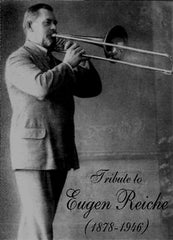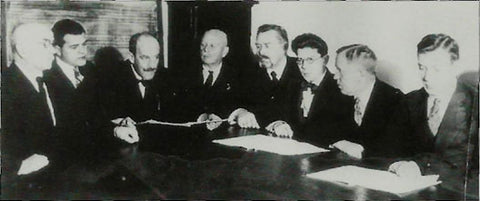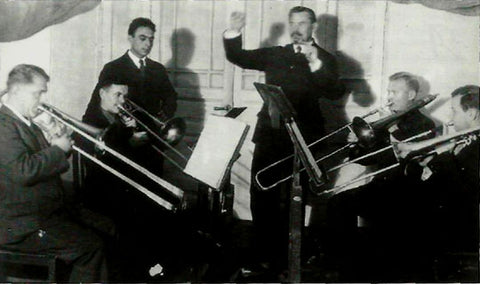Articles
A TRIBUTE TO EUGENE ADOLFOVICH REICHE

Eugene Adolfovich Reiche (1878-1946)
During the late 19th and early 20th century, Eugene Adolfovich Reiche was a prominent musician on the Russian music scene. He has produced numerous popular masterpieces and plays for the trombone that remain popular today. Known for his musical skills, particularly his trombone playing, he became a Professor at the St. Petersburg State Conservatory. Considered to be one of the most influential trombone players and musical geniuses at St. Petersburg Conservatory, he was well-known for his unique style of music that combined Russian and German styles.
Eugene Reiche was introduced to music at an early age. He was taught to play the violin at the age of 8 by his father. As the years went by, he and his brother became fascinated with the clarinet and studied it for 2 years. In 1881, he was admitted to Dresden University as a trombone player.
Over the next few years, he entered several contests and played with various orchestras in Russia. He played with the Symphony Orchestra of the Zoological Gardens, the Orchestra Shermetiev, and the Italian opera were during his time in St. Petersburg. During one tournament, he performed his song (1 Concerto Trombone B-dur) using the bass trombone. This gained the attention of the Chief Conductor of the Theatre, EF Napravnik.
This is considered a turning point in the musical world, as one of the finest theater trombone groups in Europe was created (AP Volkov- 1 trombone, W Kuznelsov- 2 trombone, EA Reiche- bass trombone, and PV Petrov- tuba). Their unique structure and tonal beauty are considered the key factor for their success. In addition, they were led by several famous conductors including A. Coates, E. Cooper, B. Dranishnikov, F. Motley, and A. Pazovsky.

While working at the theater, Reiche was involved in various tasks, such as working as a concert performer in the major symphony orchestras. While at the theater, he visited his parents in Dresden in 1903 and 1913. During his visits, he wrote about his career as a soloist from both Russia and Germany, specifically Dresden, where he most often played
EA Reiche was known as one of the most outstanding soloists of his time due to his strict adherence to academics and powerful playing style. His performances in Russia have been preserved and showcase his talent as a musician and a conductor in St. Petersburg. His performances on the resorts of Cherepovets, Perm, and Sestroretsk were also preserved. His expert play still holds the respect of the media. According to the press, his work as a trombone player and conductor in the musical operas, “Geisha” and The Count of Luxembourg”, were “highly professional jobs.
In 1924, an article, “The Theater and the Arts”, that appeared in the newspapers praised his works with the line, “The orchestra managed by Honored Artist of the Mariinsky Theater EA Reich is known to the public in Cherepovets classical repertoire and exceptional techniques of execution.”
His impressive talent allowed him to have a powerful influence on this field. His contributions were primarily composed of 2 concertos for trombone and orchestra.
Trombone:
- (1st B-dur1903, and A-dur1906 city – has the years of publication)
- books of duet for trombone (about 80 studies).
Orchestra:
- Concert Waltz (1908)
- Intermezzo (1909)
- The Game of mosquitoes
- March “Hurrah”
- an operetta (1924) –name not preserved
His compositions was the backbone of all Russian Trombone player´s repetoire. One of his contributions, the second concerto for trombone (B-dur), is performed in numerous trombone competitions throughout Russia.

His masterpiece continues to show in the mid -20th within Russia but not in his homeland Germany. But in recent times Eugene Reiche’s works were already on records by the works of German Trombonist Army Rozin and Jurgen Havnel – both are from Stuttgart and Berlin respectively.
Although his masterpieces continued to be heard in Russia through the mid-20th century, they were not heard in his homeland of Germany. However, in recent years, Eugene Reiche’s works have been showcased on records by German trombonists, Army Rozin of Stuttgart and Jurgen Havnel of Berlin.
In 1906, EA Reiche’s brilliancy had reached a level that made him ready for teaching. He began his teaching career in the Cadet Corps. In 1918, Reich transferred from his position as a Cadet Corps instructor to the Musykantsky military courses. In 1920, he led a section of the military orchestra in St. Petersburg. As a Professor of Trombone, EA Reich earned a reputation for excellence among colleagues and students. The two colleges he taught music at are currently called the College of Music.
In 1933, he was invited to teach at the Leningrad State Conservatory. In 1935, he was nominated to be a Professor of Trombone by the Wind Instrument Department after the death of Professor P. Volkov, a colleague he had worked with in the theatre. After reading the recommendation for promotion he wrote for Eugene Reiche, it becomes obvious the Department Head truly respected his skills as a musician.
His reputation as a music teacher has been highly praised and is best represented by his top student, Eugenia Adolfovich, who has played in a famous Russian orchestra. His work as a teacher can still be seen in the creative and balanced music that his students created.
When looking at his teaching methods, it becomes apparent that he didn’t disuade his students. Instead, he encouraged his students to allow the music they wrote to speak for them. In the classroom, he would share his experiences playing classical music by world famous conductors. At home in the classroom, he would often accompany students on the piano to show how approachable he was.
In March 1941, one of his students, Joseph Polyatskin, was awarded first place in a union competition. During this event, EA Reiche was invited to be a judge. After participating in this event, World War II erupted, a tragedy that would change his entire life.
Nina G. Venetsiyanova, his granddaughter recalled his life during the war, “War has been an ordeal for all of us, but Reich was exacerbated by his German ancestry. The news of the outbreak of war found him at his house in Sestroretsk. Eugene Adolfovich desperately clutched at his head and cursed Hitler.”
Life was miserable for EA Reiche during the war. Penniless and starving, he was expelled from Leningrad, the place he had dedicated his life and music to. He moved to a remote village in Kyrgyzstan, near the city of Tashkent. The area was so remote that even a mirror brought hime by his wife, was to them a great discovery.
After receiving a congratulatory telegram for his birthday, he wrote, “We have here a lot of camels and donkeys. Camels are very, very tall, and they can carry very heavy loads on their backs. Donkeys are much smaller and very stupid, but also very strong.” What is the spirit of man?!
When the Conservatory returned to its native city of Leningrad in 1944, EA Reiche was denied permission to return. Instead, he continued his work in Tashkent. He was so distraught, both mentally and physically, that in 1946, he passed away after a severe attack of angina. His remains were buried in Tashkent Cemetery. At his gravesite, a stone memorial was constructed in honor of this great musician.
Links :